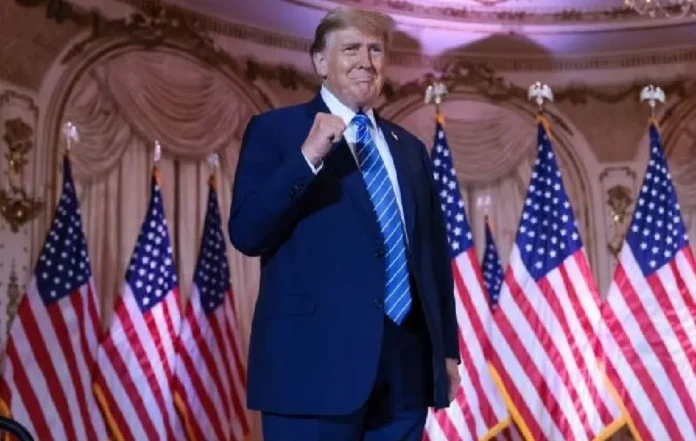By Kenneth Tiven
Donald Trump’s anticipated return as US president is expected to send shockwaves through the immigrant community, particularly among the estimated 7,50,000 Indian citizens living in the US without legal status. Immigration policies under Trump’s leadership would likely cause distress for countless families while creating a boom for immigration attorneys in the US and India. Indian immigrants on H-1B visas face a different set of challenges, with potential changes to the visa programme under a Trump administration.
With considerable influence of tech-magnate Elon Musk on Trump’s policy approaches, initial impacts on high-tech industries may be delayed. However, the situation for undocumented immigrants could become dire, as Trump’s allies advocate for aggressive deportation and increased scrutiny of immigration applications. Johnson Myalil, a prominent immigration law firm, estimates that the majority of undocumented Indians in the US come from Punjab and Gujarat. And now, increasingly from Haryana.
Many have US-born children, who, by birthright, are American citizens, adding complexity to potential deportations. Impact on families and jobs deportations, if carried out, would have significant effects on Indian-American communities and the broader US economy. Many undocumented Indian immigrants work in farming, food processing, and hospitality and fill positions that are often overlooked by American workers.
The removal of these workers could disrupt entire sectors, leaving thousands of unmade hotel beds and a shortage of labour in fields Americans are less inclined to fill. The decline in US dollar remittances to families in India would also have economic consequences, creating ripple effects in both the countries.
A divided Congress and shifting visas
Though Trump has claimed a “landslide”victory, congressional control remains contested. Republicans, however, are likely to control the Senate, granting Trump greater ease in appointing officials to key immigration agencies. His previous administration’s approach to governance—rapid decision-making with minimal regard for consequences—suggests a return to strict policies, particularly for H-1B visa holders. Among these are potential reversals of work authorization for spouses of H-1B and L-1 visa holders, a measure that was introduced under Obama to help families meet rising costs in the US. The H-1B visa programme has long been a cornerstone for skilled Indian professionals in America.
Yet, Trump’s “America First” approach and his popularity among non-college-educated Americans could spell trouble for foreign professionals. Hardline advisers, such as Stephen Miller and conservative commentator Tucker Carlson are likely to push for tighter restrictions, possibly limiting H-1B eligibility to applicants with advanced degrees and raising wage requirements to make US companies less reliant on foreign workers.
Economic uncertainty and the public charge rule
Economic uncertainty looms, partly driven by Trump’s proposed tariffs and tax cuts. As tariffs on imported goods trickle down to consumers, inflation could rise, impacting lower- and middle-income families. Foreign workers, particularly those on temporary visas, are often the first to lose their jobs during economic downturns, amplifying the vulnerability felt by many Indian immigrants.
Under Trump’s previous term, immigration procedures slowed as applications underwent heightened scrutiny. Even minor application errors could result in rejections, adding to the atmosphere of anxiety. Trump’s potential reimplementation of the public charge rule, which requires applicants to demonstrate financial independence, could pose additional hurdles for green card aspirants, forcing them to provide exhaustive financial documentation.
Birthright citizenship and the future of immigration policy
One of the most controversial issues Trump might pursue is altering the Fourteenth Amendment’s birthright citizenship clause, which grants citizenship to anyone born on US soil. Trump has suggested requiring at least one parent to be a US citizen or legal resident to pass citizenship to their child. This move, if enacted, would profoundly impact the US demographic and could make life harder for many families of Indian origin.
Chain migration policies are also in Trump’s crosshairs, specifically the F4 preference category visas, which allow US citizens to sponsor their siblings. Hardliners believe reducing these family-based immigration paths could help shift the US towards a more “merit-based” system, similar to those in Canada and Australia. Such a shift, however, would disproportionately affect African and Asian immigrants, who rely more on family reunification provisions.
An atmosphere of fear and urgency
As rumours of sweeping reforms spread, Indian immigrants are scrambling to explore options for naturalization and family sponsorships. Immigration lawyers report a wave of consultations, with many clients seeking to secure legal standing before new policies take effect. The potential return of the public charge rule could delay applications further, with even small paperwork errors leading to denials.
Trump’s high-stakes agenda
As Trump nears his return to the Oval Office, his promise of a “dictatorship on day one” has heightened fears of unchecked authority. Surrounded by loyalists, Trump’s intentions to dismantle long-standing democratic norms could redefine the landscape for immigrants.
Kamala Harris, a descendant of Indian immigrants and a central figure in the previous administration, has warned that Trump’s approach will come without “guardrails,” posing a risk to democracy itself. The stakes are high for Indian immigrants in the US, with potential changes on the horizon that could reshape family reunification, work authorization, and citizenship itself. As Trump assembles a team intent on curbing immigration, Indian-Americans—many of whom once rallied behind his economic policies—may find themselves in an unprecedented climate of uncertainty, facing choices that will define their future in America.
—The writer has worked in senior positions at The Washington Post, NBC, ABC and CNN and also consults for several Indian channels


